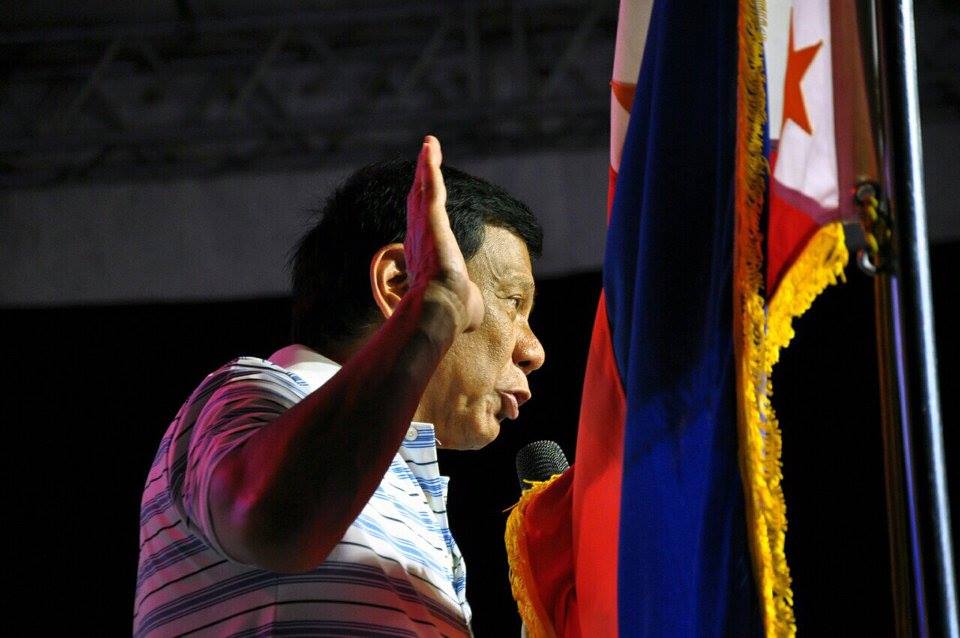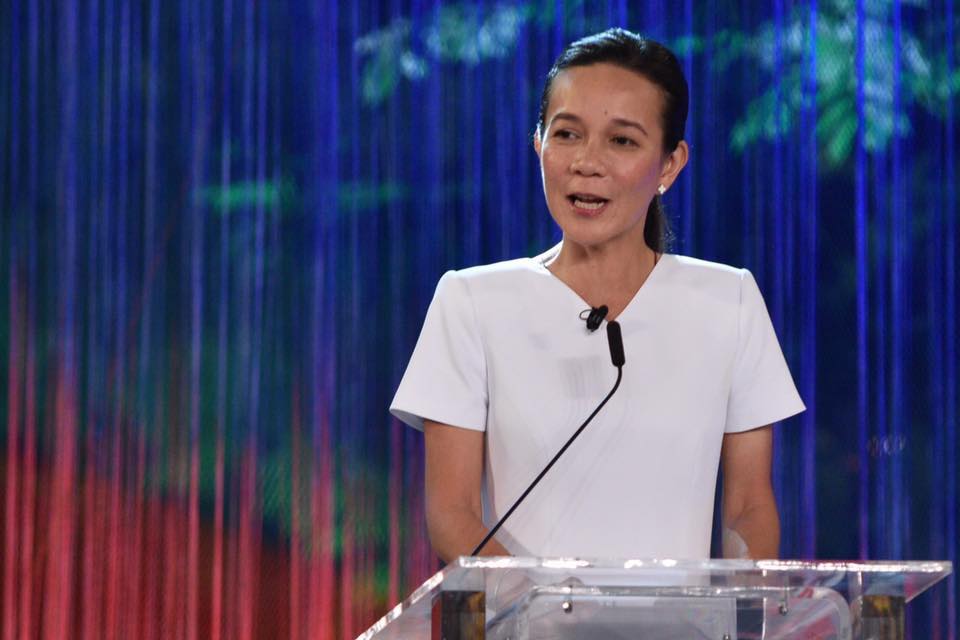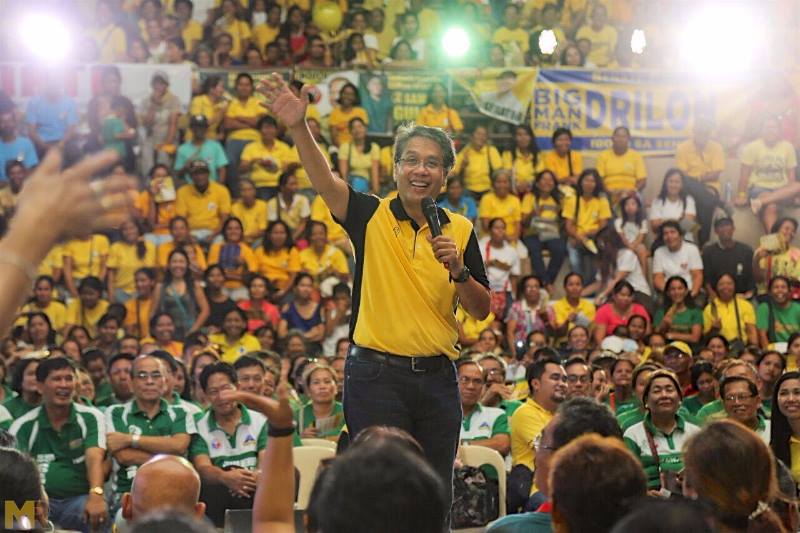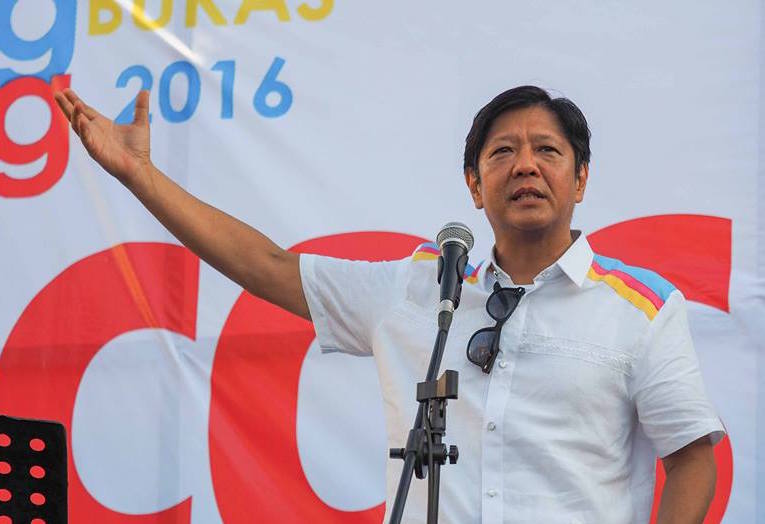
It’s hard not to think of Rodrigo Duterte as the Donald Trump of the Philippines.![]()
But in truth, he’s more like Joseph Arpaio — a conservative, tough-on-crime kind of guy willing to do whatever it takes to clean up his city, human rights or the justice system be damned.
At age 71, ‘Rody’ Duterte, who has served for a total of 22 years as mayor of Davao City, has vaulted to a lead in the polls to become the leading presidential choice among voters in the Philippines when they go to the polls on May 9. It’s an election in which Philippines might turn from liberalism to illiberalism not only by electing a Duterte presidency, but also by supporting the restoration of the Marcos family — the son of Ferdinand Marcos, the country’s autocratic ruler from 1965 to 1986, is running for the vice presidency as well.
Duterte is a presidential candidate with tough talk on crime, corruption
Known domestically as the ‘punisher,’ Duterte is not a man to cross. He brags about killing criminals, especially drug dealers, with his own gun, taking extrajudicial justice into his own hands where he sees fit. He openly admitted last November to killing three rapists and kidnappers in Davao City, and he said last week that he would kill his own kids if he found out they were using drugs. Duterte has trekked across the country delivering a fiery nationalist stump speech, often with his fist raised in the air, a variant of which serves as his campaign logo. It’s not a subtle appeal Duterte is making to supporters, who also casually refer to him as ‘Duterte Harry.’
For the United States, the Philippines figures heavily in the growing US strategic and military interest in the Pacific Rim, and the outgoing Obama administration hopes that, in particular, the Trans-Pacific Partnership (TPP) will draw the Philippines closer to the United States and further, economically speaking, from China. Today, officials in the administrations of both outgoing US president Barack Obama and outgoing Philippine president Benigno ‘NoyNoy’ Aquino III view the growing cooperation as mutually beneficial.
In no uncertain terms, a Duterte victory next Monday in the presidential election would make US-Philippine relations much more difficult.
It’s not a small matter. The Philippines is the world’s 12th-most populous country, with 103 million people and growing.
Davao City, the fourth largest in the country, lies in the far tropical south, and Duterte has presided over its transformation from a hub for communist and left-wing radicals to a case study in law and order. In a country where everyone seems to be worried most about corruption and crime, Duterte and reports of how he’s tamed Davao City over 20 years in power have captured the national zeitgeist. Elected to national office just once (18 years ago) throughout his decades-long career, Duterte can also style himself as an outsider, relatively speaking. Like most politicians in the Philippines, Duterte comes from an influential family — his father was an attorney and a former governor of what used to be Dávao province.
But that’s where the similarity to most Philippine politicians ends.
Braggadocio about personally killing drug dealers in Davao City and his ‘take no prisoners’ approach to anti-crime efforts have touched a chord with voters. Reporters questioned him when he kicked off his campaign last December about organizing death squads and killing over 700 people; Duterte responded (only half-jokingly) that he had killed more like 1,700 people.
After years of democratic stability, economic liberalism and growing ties in the international community under the Aquino administration, Duterte’s critics worry that he’s a strongman in the making whose six years in office will be marked by human rights abuses at the national level and unpredictable relations abroad. Once expelled from high school, Duterte won his law degree and began a career as a prosecutor, where he pursued both military officials and anti-government activists alike, in an imperfect justice system where corruption seemed to play a more critical role than the rule of law.
Aquino leaves office as a popular president

Aquino, whose father was assassinated in 1983 after a long career denouncing authoritarian leader Ferdinand Marcos and whose mother came to power on the strength of the pro-democracy ‘People Power Revolution’ in 1986, has worked to boost his country’s institutions, however imperfect. Duterte, for better or worse, comes to national politics with the assumption that Philippine institutions, especially criminal justice, are inherently and, possibly, incorrigibly flawed.
Duterte shares in common with Trump a penchant for hot-headed, off-the-cuff remarks as well. After he made a joke about raping an Australian missionary nun and the Australian and US embassies registered their criticism, he replied that their ambassadors should ‘keep their mouths shut,’ threatening to cut ties with the United States. But Duterte will also talk up his country’s alliance with the United States when he’s standing against growing Chinese aggression in the South China Sea, where the Chinese are forming artificial islands in Philippine fishing waters.
In a country where nearly 85% of the population are practicing Roman Catholics, Duterte cursed Pope Francis I as a ‘son of a bitch’ in 2015 after causing traffic jams in his visit to Manila (though he subsequently sent a letter of apology to the pope, in a rare moment of humility). In the past week, Duterte joked about lighting the Singapore national flag on fire after the Singapore embassy disavowed an alleged endorsement from Singapore’s prime minister Lee Hsien Loong.
Aquino, who is popular, as far as lame-duck presidents go, has called Duterte a would-be dictator, and he argued that a Duterte-led presidency would violate constitutional rights. None of that seems to matter to voters, however, who still rank Duterte over four formidable rivals, including Grace Poe, a popular senator; Jejomar ‘Jojo’ Binay, the sitting vice president; and Manuel ‘Mar’ Roxas, a former secretary of the interior and local government who has Aquino’s personal support.
Duterte, for all his anti-drug, anti-crime bluster, is hard to pin down on a traditional left-right spectrum. For example, he supports equality for the LGBT community. He’s embraced a more socialist approach to economic policy and a protectionist approach to international trade.
That has some appeal in a country that, for all its economic progress, still rates a GDP per capita of under $2,900 — just slightly more than Vietnam, but less than Indonesia, Samoa, Fiji or Thailand and far less than China, Malaysia, South Korea and Japan. That’s despite years of annual GDP growth in excess of 5% under the Aquino administration, which has broadly supported the TPP negotiations, economic liberalization, anti-corruption efforts and a closer strategic relationship with the United States. The Philippines grew by 5.8% last year, more than any other ASEAN country, and is expected to exceed 6% growth in both 2016 and 2017. Like many developing countries with growing economies, however, too many voters feel that frothy economic growth has not — and might never — filter down to them.
Despite the worries of the business sector that Duterte, nominally the candidate of the Partido Demokratiko Pilipino-Lakas ng Bayan (PDP-Laban, Philippine Democratic Party-People’s Power), will be a disaster for the economy as president, there’s still reason to believe he will continue the kind of economic policies and bilateral relationships that Aquino has emphasized in his administration, even if it means that he’ll do so while cracking down on crime in a way that runs roughshod over human rights. Duterte himself says that his presidency will be a ‘bloody’ one if elected, in which drug dealers and other criminals will be killed.
Grace Poe and opposition falling further behind

Polls aren’t always reliable in the Philippines, but they have consistently shown that Duterte stole the lead from Poe in April and hasn’t looked back.
For a long stretch, it seemed as if Poe’s greatest challenge en route to the presidency would be preventing the country’s supreme court from blocking her candidacy. Poe is the adopted daughter of the late Ferdinand Poe, Jr., a famous movie actor who ran for the presidency himself in 2004 and, perhaps a harbinger for his daughter, frittered away an early lead and lost the election.
Poe emerged on the political scene in 2013 as the star of that’s year’s midterm elections as the top national vote-winner. Nominally an independent, she ran under the ‘Team PNoy’ banner associated with the Aquino administration. In the run-up to her presidential campaign this year, she faced legal questions about her eligibility given that, as an orphan, she couldn’t prove that she is a natural-born citizen. Moreover, she also faced tough questions about renouncing her Philippine citizenship while living in the United States and additional legal questions about whether she would meet the 10-year residency
Though her personal charisma and life story are her greatest assets, she represents, in policy terms, continuity of the Aquino administration — she’s in favor of economic liberalization, anti-corruption efforts, trade liberalization and stronger bilateral relations with the United States.
If Poe loses on Monday, as many polls forecast, it will be because the anti-Duterte vote is split among her, Binay and Roxas, as there’s no runoff among the top two candidates. The presidential challenger with the greatest number of votes wins — whether it’s 51% or 25%.

Roxas, the candidate of the Partido Liberal ng Pilipinas (Liberal Party), is running third in most polls, ran for the vice presidency in 2010 as Aquino’s running mate (he wasn’t elected, because voters elect the president and vice president separately). Aquino ultimately appointed him as interior and local government secretary. Roxas is the son of a former senator and the grandson of a former president, Manuel Roxas. Binay, the candidate of the opposition United Nationalist Alliance (UNA), who won the vice presidency despite his differences with Aquino, had hoped to become the beneficiary of the boom times of the Aquino years.
Duterte, however, isn’t the only controversial candidate in Monday’s general election, in which Philippine voters will elect all 297 members of the lower house of the Congress, the Kapulungan ng mga Kinatawan (House of Representatives) and 12 seats (one half) to the Senado (Senate), along with all governors, mayors and other local offices. Manny Pacquiao, the world boxing star, will likely win reelection to the House of Representatives, despite contending earlier this year that people in same-sex relationships are ‘worse than animals.’ Meanwhile, Geraldine Roman has a good chance of become the first transgender member of the House of Representatives.
A Marcos son vies for the vice presidency
The frontrunner for the vice presidency is Marcos’s son, Ferdinand ‘BongBong’ Marcos, Jr. Even after 1986, the Marcos family didn’t fade away; instead, they used their ties to local powerbrokers in Ilocos Norte, in the far northwest of the country, to claw back a political profile. His mother, former first lady Imelda Marcos, was elected to the House of Representatives in 2010, and Bongbong has been a senator since 2010 and, for the preceding 12 years, served as the governor of the Ilocos Norte region.
This year, Marcos is serving as the running made to Miriam Defensor Santiago, a politician who is most notable for serving in all three branches of the Philippine government (and who, herself, is running last in the presidential race). But Marcos has made it clear that he would support a Duterte presidency. Marcos hasn’t shied away from his father’s legacy, posting photos with his father on his Instagram account.
The race for the vice presidency is much closer, according to polls. Marcos’s chief opponent is Alan Peter Cayetano, a senator since 2007. If Marcos wins, however, it will give him a platform from which to pursue the presidency in 2022.
